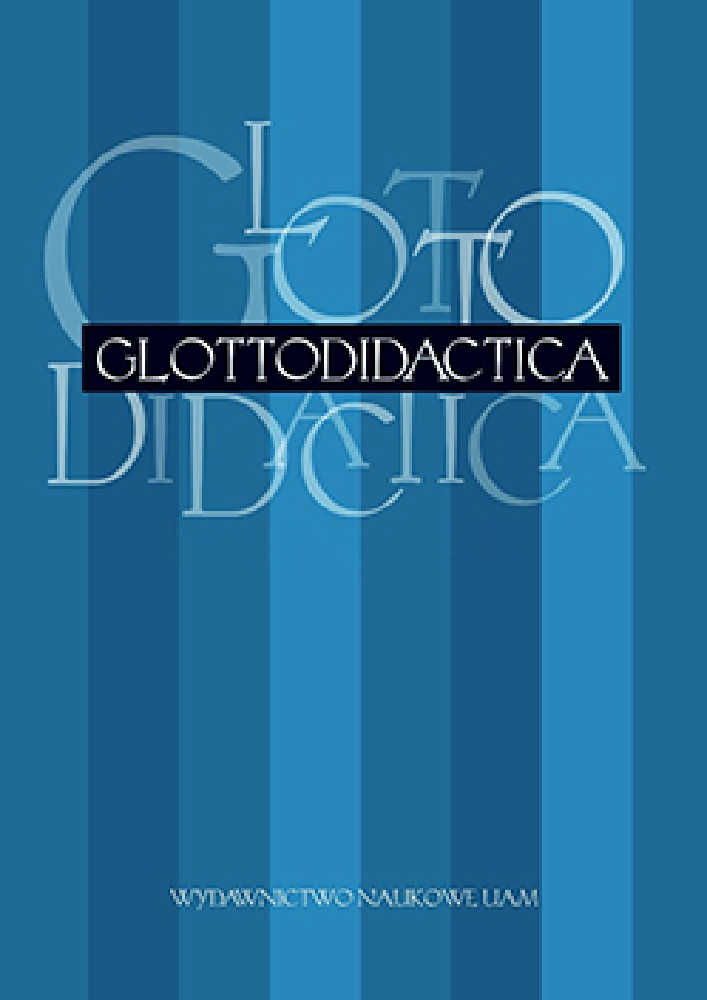Résumé
The article starts with a discussion of the essential theories of reading and focuses on different models of understanding. In the next step, based on fragments taken from a novel by M. Zusak, the article develops an integrative literary and language teaching model in intercultural school lessons of literature in a way which stimulates a highly functional analytical, receptive and productive handling of language semantics and performance. It demonstrates the combination of literature and film as a possibility for successful literary, language and media learning.
Références
Ahrenholz, B. (2008). Erstsprache – Zweitsprache – Fremdsprache. In: B. Ahrenholz / I. Oomen- Welke (Hrsg.). Deutsch als Zweitsprache. Baltmannsweiler: Schneider, S. 3–16.
Baumert, J. (2001) (Hrsg.). Deutsches PISA-Konsortium. Pisa 2000. Basiskompetenzen von Schülerinnen und Schülern im internationalen Vergleich. Opladen: Leske + Budrich.
Belgrad, J. / Fingerhut, K. (1998). Annäherungen an Literatur im Unterricht. In: J. Belgrad / K. Fingerhut (Hrsg.). Textnahes Lesen. Baltmannsweiler: Schneider, S. 5–14.
Chomsky, N. (1957). Syntactic structures. New York: de Gruyter Mouton.
Colombo-Scheffold, S. (2010). Ausländisch für Deutsche: Sprachen der Kinder – Sprachen im Klassenzimmer. Freiburg: Fillibach.
Dauer, Y. (2012). Verfolgung, Angst, Tod – und Hoffnung? Der 2. Weltkrieg im Spiegel der Kinder- und Jugendliteratur am Beispiel von Markus Zusaks „The book thief“. In: A. Bartl / A. Klinge (Hrsg.). Transitkunst: Studien zu Literatur 1890–2010. Bamberg: Bamberg Press, S. 475–513.
Ehlers, S. (2008). Lesekompetenz in der Zweitsprache. In: B. Ahrenholz (Hrsg.). Deutsch als Zweitsprache. Baltmannsweiler: Schneider, S. 215–227.
Feilke, H. / Tophinke, D. (2016). Grammatisches Lernen. Praxis Deutsch, 256, S. 4–12.
Freise, M. (2006). Vier Weisen nach dem Text zu fragen. In: V. Bockholt / M. Freise / W. Lehfeldt / P. Meyer (Hrsg.). Finis coronat opus. Göttingen: Vandenhoek & Rupprecht, S. 71–83.
Gadamer, H.-G. (1990). Hermeneutik. Wahrheit und Methode: Grundzüge einer philosophischen Hermeneutik. Tübingen: Mohr Siebeck.
Iser, W. (1976). Der Akt des Lesers. München: Fink.
Johnson-Laird, P.N. (1983). Mental models. Cambridge: CUP.
Karg, I. / Kuzminykh, K. (2014). Sprache und Literatur als Bildungskomponenten. Diskurs, Historie und Empirie. Frankfurt a. M.: Peter Lang.
Kintsch, W. (1998). Comprehension: a paradigm for cognition. Cambridge: CUP.
Kniffka, G. / Siebert-Ott, G. (2007). Deutsch als Zweitsprache. Lehren und lernen. Paderborn: Schöningh.
Korte, H. (2002). „K wie Kanon und Kultur. Kleines Kanonglossar in 25 Stichwörtern.“ In: H.L. Arnold (Hrsg.). Literarische Kanonbildung. München: edition text + kritik, S. 25–38.
Krifka, M. (2014). Das mehrsprachige Klassenzimmer. Berlin: Springer.
Kuzminykh, K. (2014). Comics und graphic novels im multikulturellen Deutschunterricht. Glottodidactica. An International Journal of Applied Lingiustics, XLI (2), S. 75–87.
Kuzminykh. K. (2017). Erzählen im integrativen Deutschunterricht. Glottodidactica. An International Journal of Applied Lingiustics, XLIV (2), S. 75–95.
Leisen, J. (2013). Handbuch Sprachförderung im Fach – Sprachsensibler Fachunterricht in der Praxis. Stuttgart: Klett-Sprachen.
Oatley, K. (1994). A taxonomy of the emotions of literary response and theory of identification in fictional narratives. Poetics, 23, S. 53–74.
Percival, B. (2013). Die Bücherdiebin. Deutschland / USA.
Schnotz, W. (2006). Was geschieht im Kopf des Lesers? Mentale Konstruktionsprozesse beim Textverstehen aus der Sicht der Psychologie und der kognitiven Linguistik. In: H. Blühdorn / E. Breindl / U. Waßner (Hrsg.), Text – Verstehen. Grammatik und darüber hinaus. Berlin: de Gruyter, S. 222–238.
Zusak, M. (2005). The book thief. Sydney: Picador.
Zusak, M. (2007). La ladrona de libros. Barcelona: Lumen.
Zusak, M. (2008a). La bambina che salvava i libri. Milano: Mondolibri.
Zusak, M. (2008b). Die Bücherdiebin. Hörbuch (gesprochen von Boris Aljinović). München: Random House Audio.
Zusak, M. (2008c). Die Bücherdiebin. München: Blanvalet / Random House.
Zusak, M. (2008d). Kitap hırsızını. Istanbul: Selim Yeniçeri.
Зусак, M. (2009). Книжный вор. Москва: Эксмо.
Zwaan, R. (1996). Toward a model of literary comprehension. In: B. Britton / A. Graesser (Hrsg.). Models of understanding text. Mahwah NJ: Erlbaum, S. 241‒256.
Licence
Auteurs
Les auteurs de textes acceptés pour publication dans la revue Glottodidactica sont tenus de remplir, signer et renvoyer à l'adresse de la rédaction, un accord sur l'octroi d'une licence gratuite pour les œuvres, avec obligation d'accorder une sous-licence CC.
Conformément à cet accord, les auteurs des textes publiés dans la revue Glottodidactica accordent à l'Université Adam Mickiewicz de Poznań une licence non exclusive et gratuite et autorisent l'utilisation de la sous-licence Creative Commons Attribution-NoDerivatives 4.0 International (CC BY-ND 4.0).
Les auteurs se réservent le droit de disposer librement de l'œuvre.
Utilisateurs
Les utilisateurs d'Internet intéressés ont le droit d'utiliser les œuvres publiées dans la revue Glottodidactica depuis 2016, selon les conditions suivantes :
- Attribution – obligation de fournir, conjointement avec l'œuvre distribuée, des informations sur l'auteur, le titre, la source (lien vers l'œuvre originale, DOI) et la licence elle-même.
- Aucune modification – l'œuvre doit être préservée dans sa forme originale. Sans le consentement de l'auteur, il n'est pas possible de distribuer l'œuvre modifiée sous forme de traductions, publications, etc.
Les droits d'auteur sont réservés pour tous les textes publiés avant 2016.
Autres
L'Université Adam Mickiewicz de Poznań conserve les droits sur la revue dans son ensemble (mise en page, forme graphique, titre, conception de la couverture, logo, etc.).
A PARTIR DE L’ANNEE 2015, LES ARTICLES PUBLIÉS DANS LA REVUE SONT DISPONIBLES SOUS LICENCE CREATIVE COMMONS : https://creativecommons.org/licenses/by-nd/4.0/deed.fr





